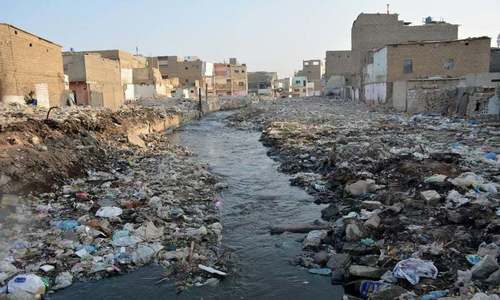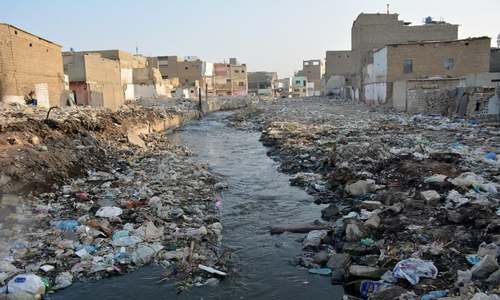Work on cleaning Karachi's storm-water drains will begin tomorrow: NDMA chairman

National Disaster Management Authority (NDMA) Chairman Lt Gen Mohammad Afzal said on Sunday that work on cleaning major storm-water drains in Karachi will begin from tomorrow (Monday).
"The main objective behind this is to prevent further damage during the next few monsoon spells," he said while addressing a press conference in Islamabad.
Earlier in the week, Prime Minister Imran Khan had directed the NDMA chairman to visit Karachi and begin cleaning up the city. The premier signed a summary authorising NDMA and the Frontier Works Organisation (FWO) to carry out a cleanliness drive in Karachi with “unlimited funds” and long-term role of the federal and military organisations.
The chairman, addressing the media after his visit, said that steps for "disaster mitigation" will be carried out so that the people of the city can be provided relief during the next few spells of rainfall.
He said that three spells had been predicted in the metropolis during the month of August with varying chances of rain. The first is from August 7 to August 10, the second on August 15 and the third from August 24 to August 26.
"At least 80mm of rainfall was recorded in one hour in some areas of Karachi during the past few days. And in some areas, the amount of rain that fell in a span of one or two hours completely overwhelmed the [drainage] system which is already working well beyond its capacity."
He added that Pakistan Army’s V Corps had been called in under the Disaster Management Act and the work on cleaning the city's drains will be carried out in two phases.
"During August and the first few days of September, we are looking at minimising the damage that has already been caused. But Karachi's problems can't and won't be solved by this. For that, we need to understand the problems of the city."
For example, the metropolis produces 20,000 tonnes of solid waste on a daily basis of which only 3,000 to 4,000 is picked up because it is "useful", he said. "Across the world, solid waste is considered a source of revenue, but for us it is a nuisance."
He stated that encroachments had popped up on the city's drains, adding that another important aspect to troubles the city was facing was the fact that the storm-water and sewerage drainage system was not separate.
"Even if the sewerage system is separate in some areas [...] you can't put that water into the [drainage system] without treating it. If you don't treat sewerage, heavy sediments will begin to settle and that system will [collapse] in two to three years."
Until these things are mended, long-term planning can't take place, he said.
"In the second phase, all stakeholders will need to be brought on board to create consensus. In my opinion, if consensus is created in three to four months [...] work can begin on a permanent solution."
He reiterated that for long-term planning, all the stakeholders would need to sit down and forge a way forward. We will have to go forward otherwise we will be back to square one, he said.
Karachi has received heavy rains in the past few weeks, wreaking havoc on the city's shaky infrastructure and leading to the deaths of several residents.
On Friday, the Sindh government, Pakistan Army’s V Corps and the NDMA had decided to assign the task of removing sludge from three storm-water drains in the city to the FWO.
The FWO will clean Sharea Faisal storm-water drains, both sides, along with adjacent choking points (such as FTC, Nursery, Gulshan-i-Zafar, Tipu Sultan Road, Karsaz, Drigh Road, Stargate). Sludge will be taken out and dumped directly at landfill sites of Jam Chakro and TP-1.
It was also decided that the provincial government, with the support of the army and NDMA, would remove encroachments from all storm-water drains in the city. The local government department with the support of the army and Rangers will remove encroachments from the embankments of the drains so that rainwater can be disposed of.













































